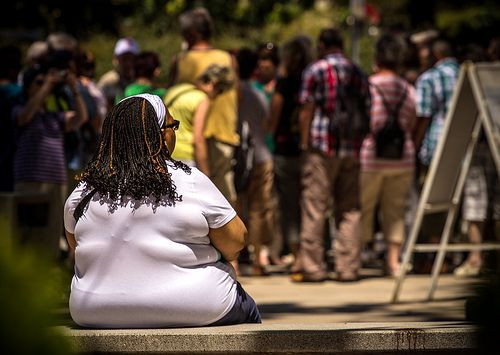Obesity’s ‘Disease’ Label May Demotivate Weight Loss, Make People Comfortable With Overweight Status

Last June, the American Medical Association formally reclassified obesity as a disease rather than a condition that may predict disease. The switch both raised eyebrows and relaxed shoulders, as critics argued the definition would further enable fat people, while apologists said the move was liberating for the obese. Amid all this hot air has swirled an earnest call for data, and now researchers have it. But unfortunately for apologists, the diseased may be getting off easy.
A new joint study from the University of Minnesota and the University of Richmond found that when obese subjects were exposed to their disease under its formal classification, they tended to look more favorably upon their own weight and see themselves as healthier. They also tended to choose an unhealthier meal option, suggesting to researchers the effects of the AMA’s classification aren’t purely conceptual; they’re concrete and may reinforce dangerous habits.
“Considering that obesity is a crucial public-health issue, a more nuanced understanding of the impact of an ‘obesity is a disease’ message has significant implications for patient-level and policy-level outcomes,” said University of Richmond psychological scientist Crystal Hoyt in a statement.
To test their theory that labeling obesity as a disease demotivates people, Hoyt and her colleagues collected over 700 participants to complete an online survey. First, subjects read an article related to health and well-being, which came in three versions. They either read about obesity as a disease, as a condition without any formal designation, or as a condition that’s specifically not a disease. By and large, the people who had read about obesity’s true classification tended to undervalue the importance of diet and weight management relative to the other two groups. And when prompted at the study’s end, they also chose a higher-calorie sandwich compared to the other two groups.
But what really interested researchers were the changes in attitude. People not only tended to value personal health less; they actually saw themselves as healthier. That is to say, changing the nature of the condition changed the extent to which people believed they were affected by it. Hoyt called this effect a “self-regulatory” consequence, meaning it compelled people to shift their lifestyle. One of these consequences, the team suspects, is choosing a higher-calorie meal option because the person now believes he or she can afford to indulge.
Of course, the apologists aren’t totally misguided. Diseases aren’t always within a person’s control. For many years, alcoholics were derided simply as drunks, with no lack of remorse or will power to speak of. The same is true for the obese. Science is still in the process of understanding how genetics impacts a person’s risk of becoming obese, as well as developing the diseases related to it, such as diabetes and hypertension.
But for all the concessions made as to why people become obese, gaining weight can never be the same as slipping into alcoholism. Food is vital. Alcohol is not. This is why so many critics bristle at the idea of obesity being called a disease: The only person in charge of a person’s diet is the person doing the eating. Genetics and other predispositions aside, there is no escaping the fact that caloric intake has a direct impact on how much a person’s weight will vary.
Despite their intriguing results, the researchers are hesitant to use the findings as fuel — at least not yet. The classification is still less than a year old, and instituting programs that cut against the AMA’s authority belies a larger mission of science; that is, to critically approach an issue from all sides and arrive at a working model for incorporating it into society. Indeed, it may be the case that through further research, obesity’s new designation helps overweight people — more than one-third of U.S. adults — confront their disease.
“In our ongoing work, we hope to gain a greater understanding of how the ‘obesity is a disease’ message influences beliefs about the controllability of weight,” Hoyt said. “In addition, we are also interested in investigating the role of this message in reducing stigma against the obese.”
Source: Hoyt C, Burnette J, Auster-Gussman L. “Obesity Is a Disease” Examining the Self-Regulatory Impact of This Public-Health Message. Psychological Science. 2014.
Published by Medicaldaily.com



























